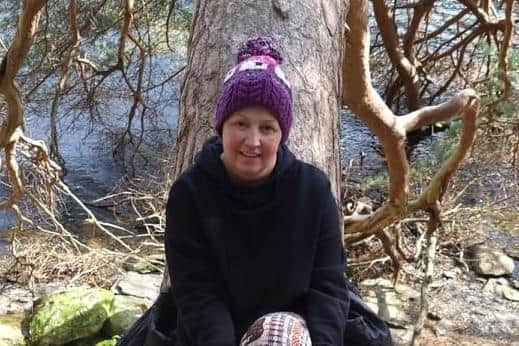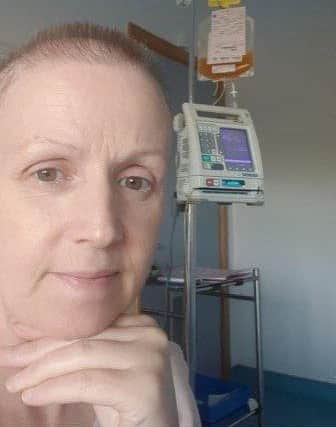Roseena speaks of gratitude to stem cell, blood and platelet donors following her Acute Myeloid Leukaemia treatment
and live on Freeview channel 276
Roseen Doherty (Toner), who lives in Clonmany, received a life-saving stem cell transplant earlier this year, after being diagnosed with the blood cancer in June 2021.
The transplant was preceded by months of intensive chemotherapy in University Hospital Galway, during which she needed to receive vast levels of blood and blood platelets.
Advertisement
Hide AdAdvertisement
Hide AdAfter the mother-of-five’s body began to reject the initial platelets, Roseena’s doctors needed to find ones that were as close a match to her’s as possible. It transpired that only one platelet donor in the country was a match. Roseena told the Journal how this person, along with her stem-cell donor - a 25-year-old man- as well as those whose blood she received, all saved her life and gave her hope throughout her treatment.


Roseena, a holistic therapist who previously also worked as a volunteer in the Foyle Hospice, had no obvious symptoms of leukaemia before she fell ill with a high temperature in the early hours of Tuesday, June 2 last year. She explained how she thought she was ‘coming down with something’ and was told by her doctor to take paracetomol. By the Thursday, Roseena began to experience an extremely sore throat, which was beginning to close and was told she needed a Covid 19 test. When this came back negative, she was given antibiotics, but her symptoms did not improve and only got worse.
“My throat was completely closed. I couldn’t eat or drink and I choked on tablets as I couldn’t get them down my throat. My son, Patrick, was just constantly carrying me ice water to try and keep me cool.”
Roseena was getting sicker and her family, including her partner, Billy Gibbons, were becoming increasingly worried. They urged her to contact the doctor again and she was sent for another Covid 19 test. When this came back negative, Roseena’s mother and sister took her to A&E in Letterkenny University Hospital, where she was seen quickly. While it was initially thought Roseena had severe tonsillitis, blood tests revealed something much more serious.
Advertisement
Hide AdAdvertisement
Hide Ad“I could see the doctors looking over at me and then, a doctor came in to me and said: ‘I’m sorry to tell you that you have leukaemia’.”


Roseena was informed an ambulance was being prepared to take her to Galway Hospital ‘straight away.’ She said she was so ill, it was hard to process what she was being told, but added how, at the time, she knew very little about AML. “I knew it was a type of cancer, but that was it. They told me that AML is actually most common in men over 65.”
Roseena was transferred to Galway and due to Covid 19 protocols had to go there alone. There, she underwent further tests and began immediate chemotherapy. A biopsy also confirmed her cancer had an aggressive cell called FLT3. “They told me I would also need a stem cell transplant. Some people with leukaemia don’t need this transplant, as chemotherapy is enough, but this FLT3 can be really hard to get rid of.” Roseena remained in Galway throughout her chemotherapy treatment, which was ‘very tough,’ and she contracted a number of infections. The most serious of this was toxoplasmosis in her eye. Doctors told Roseena this infection could mean she wouldn’t be able to receive the stem cell transplant and this was an extremely dark and worrying time.
“I asked them if I was going to die and they said they would try something and what they could. It caused a lot of anxiety and tears. I was up and down to the ophthalmologist and was on antibiotics and steroids. No one knew what was going to happen, but they eventually told me the antibiotics were working and I could get the transplant.” Roseena was in the 25-bed Claddagh ward in Galway, which had individual rooms. Billy and her parents were able to visit,but these had to be cleared by the hospital and many precautions had to be taken. She said the nursing and care staff were ‘amazing’ during her stay, bringing her food when she couldn’t eat the hospital food and providing crucial support. She added how the local community was also ‘fantastic,’ sending cards messages of support, lighting candles and saying prayers and this all gave her strength. “People were so, so good, I honestly couldn’t even begin to explain how kind they were and still are.”
Advertisement
Hide AdAdvertisement
Hide AdDuring her time in Galway. Roseena needed to receive a lot of blood and platelets and said donations of these were crucial.
“On the second round of chemo, they discovered that my body was rejecting the platelets, so they had to source platelets that were as close a match to me as they could find. Only one person who donated them was a match to me. At one point, they were giving me platelets and my body was rejecting them within hours. I think your platelet count is supposed to be around the 100,000 and there were times mine was at three. When that happened, I wasn’t allowed to get out of bed or even blow my nose as they were worried about internal bleeding. I was only one person who needed the platelets and there were 25 others in my ward, who also all needed them. I would really ask anyone who can to consider donating them. Unfortunately, while we have blood banks going around here, you have to go to Dublin to donate platelets. But we have a lot of people locally who live in Dublin or are a student down there. If they could maybe make an appointment with St James - it’s not a big procedure and it makes such a huge difference to people. If there are more people in the platelet pool, the doctors would have more choice when they need it. When I landed in Galway, within 24 hours they were carrying bags of blood and platelets to me, as at that time my blood was basically just cancer cells. This was really important in keeping me alive. And, if you can’t donate platelets, I’d ask people to please consider donating blood. I know it’s a wee bit more difficult now as you have to make an appointment, but that massive need is still there. It really is life saving. The amount of blood I needed from entering hospital the first day until now has been unbelievable. Every donation makes a difference to someone.” Roseena was discharged from Galway on November 18, five months after she first arrived, as she waited for her stem-cell transplant. All five of her siblings were tested, but none were a match - the chances they would be were around 25%. This meant doctors had to turn to the stem cell donor ‘bank’, which is Europe wide, to seek a match for Roseena. This match was found in a 25-year-old male. Roseena does not know who he is or where he is from, but said she will be eternally grateful to him.
“He doesn’t even know me, but he signed up to do this. You register with the stem cell board and they take you in, do tests etc and then put you on file for match. The bank is a Europe-wide one. Only for this young man, I couldn’t have had my transplant. He had to take time out to donate the cells and then recovery and he did all that for a stranger. I am so, so grateful to him.” After a year, Roseena will be able to write a card to the man and said she fully intends to do so. She doesn’t remember much about the time post-transplant, which took place on February 21 in St James Hospital and the recovery was long. However, she powered through and is very grateful to everyone who helped and supported her along the way. She was released from hospital to a nearby apartment on April 1, which she was delighted with, as it meant her family could stay with her. She will continue to receive biopsies every three months for two years and said she has been told both Cancer Care West and the Irish Cancer Society will be on hand any time she needs them. She is ‘feeling good,’ walks every day and is looking to the future. This includes hopefully returning to volunteer in the Foyle Hospice, which she ‘absolutely loved’ as well as her own work when she feels well enough to do so. While she is taking things slowly, Roseena also hopes to launch a fundraiser later this year.
You can find out about donating bloods, platelets and stem cells at www.giveblood.ie, https://nibts.hscni.net/donating-blood/where-to-donate/ and https://www.bbmr.co.uk/joining-the-register/